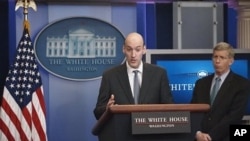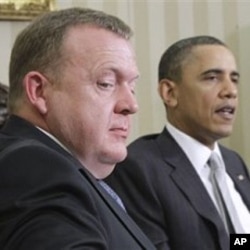President Barack Obama said Monday that the United States is doing everything it can to assist Japan in dealing with the aftermath of last week's earthquake and tsunami, and the resulting crisis at Japanese nuclear power plants. Meanwhile, U.S. officials are discussing concerns that events in Japan raise for nuclear power generation in the United States.
Nuclear power is an important component of energy production in the United States, providing about 20 percent of electricity consumed in the country.
But explosions at earthquake damaged Japanese atomic reactors, as Japanese officials struggle to prevent nuclear core meltdowns, have sparked renewed debate in the U.S. and elsewhere about the safety of nuclear power.
Appearing at a White House news briefing, Nuclear Regulatory Commission Chairman Gregory Jaczko said that due to the distance involved, there is little chance that harmful radiation from Japan's damaged reactors will reach Hawaii or the U.S. mainland.
But reporters pressed him about the extent to which the situation in Japan could alter Obama administration thinking about the safety of nuclear power plants in service in the United States.
"What I can say is, we have a strong safety program in place to deal with seismic events that are likely to happen at any nuclear facility in this country," Jaczko said. "As we get past this immediate crisis, where we continue to provide support to the Japanese, we will gather information about the specifics of the event. But I don't want to speculate too much about what exactly were the relevant factors in Japan at this point."
Jaczko called the situation in Japan "serious," and said U.S. reactors are built to withstand earthquakes and tsunamis.
Deputy Energy Secretary Daniel Poneman said U.S. officials will take into account information emerging from events in Japan, but he indicated there will be no sudden change in U.S. energy policy.
"We are going to continue to take all learnings into account as we proceed, from episodes that happen, from hypotheticals that we might be able to come up with," he said. "[There is] nothing new about it. It is a matter of our continuous approach to our own development or our energy resources to make sure they are done continuously and safely."
President Obama said the United States and other nations will stand by Japan and provide whatever assistance it needs to deal with the earthquake, tsunami and nuclear situation.
The president spoke in the Oval Office after he met with visiting Danish Prime Minister Lars Loekke Rasmussen.
"I am in close contact with [Japanese] Prime Minister [Naoto] Kan," he said. "And our teams are in close cooperation, as is our military, in the region, and we expect to continue that cooperation until we have some stabilization of the situation."
The president did not mention the debate in the United States about nuclear power resulting from the situation in Japan. He spoke only in general terms about the need for the U.S. to move more toward energy independence.
Nuclear Regulatory Commission Chairman Jaczko told reporters that U.S. technical experts are in Tokyo to help their Japanese counterparts deal with damage to reactors from the earthquake and tsunami.
Asked whether he could say the situation in Japan might worsen, Jaczko declined to speculate. But he said that Japan is a technically advanced nuclear country with significant resources.
















